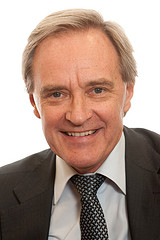Message from Faculty of Education (Faculty Office)
 The International Baccalaureate:
The International Baccalaureate:
History, Philosophy, and Pedagogy
Dr Ian Hill
Former Deputy Director General,
International Baccalaureate (IB) Organization, Geneva
Time: 4:00-6:00PM
Venue: Rm 408A-410A, Meng Wah Complex, HKU
Chair by: Dr Bennan Zhang
Summary
This presentation identifies the philosophical, pedagogical and pragmatic reasons for the creation of the IB Diploma Programme during the 1960s and how this attracted government education reformers, international school heads and teachers, statesmen and influential parents via schools, UNESCO, and funding bodies to support the initiative. The founders of the IB were deeply affected by the Second World War and wanted an education which would avoid such conflict in the future. Philosophically they promoted intercultural understanding, an appreciation of multiple perspectives, global sustainable development, and humanitarian values (caring and compassion) so that nations and peoples might live in peace with each other.
Pedagogically the proponents of the IB were reacting against an education model prevalent across the globe which was based principally on the accumulation of facts, rote learning, memorisation, and teacher-centred, subject-oriented classroom practice. By the 1960s influential educators such as Dewey, Rousseau, Piaget, Bruner, A.S. Neill, and Vygotsky had proposed alternatives. This led the IB founders to explore a more child-centred, constructivist approach where interdisciplinarity, critical thinking, problem solving, teacher-student interaction, educating the whole person (cognitive and affective domains including community service), and skills for research and life-long learning played an important role.
The IB was conceived initially for international schools which catered for a globally mobile student population accompanying their parents stationed abroad; these parents were working principally in embassies, for the UN and its agencies, and for multinational companies. They needed local education opportunities which would ensure continuation of schooling and university entrance in their homeland or in other countries. So this was the pragmatic motivation for creating the IB diploma: to have an internationally-recognised university-entrance qualification.
About the Speaker
Dr Ian Hill is the former Deputy Director General, International Baccalaureate (IB) Organization, Geneva. He was born in Tasmania. He spent the first 18 years of his career as a teacher and senior administrator in Australian government schools, lecturing part-time at university in teaching methodology, and later led a government curriculum development group in his home state. Before leaving Australia in 1990, he spent four years as Senior Private Secretary and Adviser to the Minister for Education in Tasmania; in that capacity he represented the Australian Council of Ministers on the International Baccalaureate Council of Foundation (1987–1990). He became Director of a bilingual IB school in France in 1990, and moved to Geneva in October 1993 to become Regional Director for Africa/Europe/Middle East for the IB. He was appointed Deputy Director General in January 2000 and retired in July 2012. Dr Hill has published numerous papers and book chapters on international education, and co-authored – with Jay Mathews of the Washington Post –Supertest: How the International Baccalaureate Can Strengthen Our Schools (2005). In 2010 a collection of his articles on the history of the IB was published in one book under the title: The International Baccalaureate: Pioneering in Education.
For enquiries, please contact Faculty of Education at 2859-2395.


